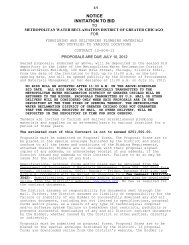Report - Metropolitan Water Reclamation District of Greater Chicago
Report - Metropolitan Water Reclamation District of Greater Chicago
Report - Metropolitan Water Reclamation District of Greater Chicago
You also want an ePaper? Increase the reach of your titles
YUMPU automatically turns print PDFs into web optimized ePapers that Google loves.
Outreach Support Services. The AMBS continued the outreach support by providing<br />
following services.<br />
Science Projects/Laboratory Tour. Infonnation on the role <strong>of</strong> wastewater microorganisms<br />
in waste recycling and technical advice on water quality monitoring and analytical methods were<br />
provided to high school students; participated in the <strong>Chicago</strong> School Science Fair program; and<br />
conducted laboratory tours.<br />
<strong>Water</strong> Environment Research Foundation Research Projects. The AMBS provided<br />
analytical sampling and monitoring support as well as technical review <strong>of</strong> WERF's research<br />
projects and regulatory documents; attended project related meetings and teleconference calls,<br />
and evaluated project proposals and final reports.<br />
University Research Manuscripts. The AMBS staff reviewed and commented several<br />
research proposals and/or manuscripts for publication.<br />
Aquatic Ecology and <strong>Water</strong> Quality Section<br />
The Aquatic Ecology and <strong>Water</strong> Quality Section is responsible for monitoring and<br />
assessing the water and sediment quality in the CAWS. An additional responsibility is to review<br />
and participate in regional work groups that fonnulate emerging federal and state water quality<br />
rules and regulations that directly relate to <strong>District</strong> NPDES pennits and to water quality in the<br />
CAWS. These regulations include the 305(b) assessment reporting and 303( d) listing <strong>of</strong> impaired<br />
waters in the IEP A's Illinois Integrated <strong>Water</strong> Quality <strong>Report</strong> and Section 303( d) List, lower Des<br />
Plaines River VAA, CAWS VAA, total maximum daily loads for Salt Creek and the West<br />
Branch <strong>of</strong> the DuPage River, and development <strong>of</strong> nutrient and other water quality standards.<br />
Field monitoring activities conducted during 2010 by the Aquatic Ecology and <strong>Water</strong><br />
Quality Section included the following:<br />
Benthic Invertebrate Monitoring. As part <strong>of</strong> the A WQM Program, benthic invertebrate<br />
abundance was assessed at 25 monitoring stations in the <strong>Chicago</strong>, Calumet, and Des Plaines<br />
River Systems from June through September <strong>of</strong> 2010. Samples were collected from 17 stations<br />
located on the deep-draft waterways and 8 stations on wadeable streams. Benthic invertebrates<br />
were collected using a 6- x 6-inch Ponar Grab sampler and 3- x 3-inch Hester-Dendy artificial<br />
substrate samplers. A kick net sampler was employed at two stations. In the laboratory, the<br />
sediment samples were 'washed, screened, and the oligochaetes (sludge wonns) were sorted out<br />
and counted. Other benthic invertebrates were sent to an outside contractor for identification.<br />
The benthic invertebrate data will be provided to the IEP A for their use in preparing the Illinois<br />
305(b) assessment report.<br />
32
















